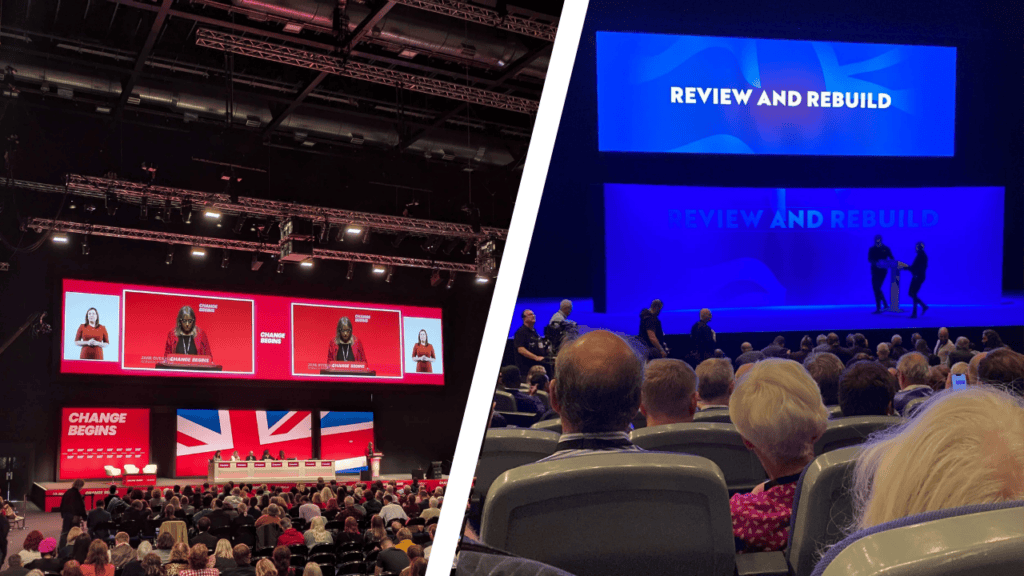Jamie and Johnny from Cast from Clay went to the Labour and Conservative Party Conferences respectively. Below are their observations and what it might mean for policy making.
Labour
By Jamie Horton
The Labour Party hosted its annual party conference between the 22nd and 25th of September. On paper, you might have expected this to be a triumphant, celebratory gathering. Labour won decisively in the recent General Election, forming the first Labour Government since 2010 with a gain of 211 Labour MPs and a simple working majority of 174. This was the biggest majority since Tony Blair’s landslide majority in 1997 and the first General Election victory since 2005.
However, (with exceptions) it didn’t quite feel that way on the ground. For lack of a better word, the vibe was quite weird. It was a strange mix of nervousness, frustration at the negative mood music, and a relatively downbeat atmosphere (not helped by the bucketing rain). In contrast, I remember the mood being markedly more buoyant in the previous two Labour conferences I attended leading up to the General Election.
This dampened spirit could in part be attributed to the realities of being in power (and nowhere was that reality more clear than in the horde of public affairs pros at every turn). Labour are now having to navigate the difficulties of putting campaign promises into the grinding machinery of government, defend the implications of their “tough choices to protect the public finances”, and deal with the heightened public and media glare from being the government of the day.
Labour has an active strategy of implementing unpopular policies early and pinning the blame on their vanquished Conservative opponents. The aim is for more positive announcements to be made in the middle and the end of their first term with the hope that their growth-triggering policies come to fruition, ready to win re-election.
However, after the early announcement on imposing means testing on the Winter Fuel Allowance, Ministers have been reluctant to pre-empt major announcements with an Autumn Budget looming on the 30th of October. That vacuum – not helped by the gloomy tone of ministers – has become an issue when combined with unfortunate headlines about expenses and donors.
Perhaps reflecting the tension, the battalions of new Labour MPs seem cautious about speaking out. As it was pre-election, message discipline is being strictly applied by the leadership, and with rare exceptions, the new loyal intake is sticking to the script. It remains to be seen if cracks might show if the gloom continues post-budget.
There were policy areas where Labour was shouting more loudly and proudly, such as on energy policy, led by the former leader Ed Miliband, who clearly relishes being back in Cabinet. This is helped by having GB Energy as a clear (and popular!) policy vehicle, with money behind it, although the sector is keen to hear more details.
The speeches by Chancellor Rachel Reeves and Prime Minister Keir Starmer were also well received. While new policies were light, they did the job of steadying the nerves of activists and ministers, showing their authority, and injecting a small note of optimism back into proceedings.
The upcoming Budget is the next milestone and has become totemic in its importance for resetting Labour’s tone. While ministers would be lobbying hard for a range of policies, the reality is that their hands are relatively tied given the framing of difficult spending cuts and tax rises. Politically and economically, the stage is set for this to be a Budget of “difficult decisions.”
Newly appointed Labour special advisers, many sourced from Labour-friendly think tanks, are still getting to grips with governing and will need time to settle. The recent upheaval in No. 10 with reported leaks, briefings and counter-briefings (ultimately leading to the departure of Sue Gray) means that they may be even more reluctant to engage with stakeholders on the record, but they will be vital in turning ideas into workable policy.
The large army of corporates, NGOs, and press at conference shows that whatever the headlines, Labour is in the driving seat. They will be able to pass virtually any legislation for the next few years.
Early signs from the Starmer government show a generally high level of caution, openness to government intervention, favouring the empowerment of local government (aside from planning), and a preference to reform institutions rather than more spending, all couched in a high degree of pragmatism.
It is also increasingly clear that the Treasury is extremely powerful, and winning the case with them will be vital for any hoped-for policy change. Beyond the Budget, the next major milestone will be the Spending Review in Spring 2025, which will set the budgets for departments for at least the next three years. The Treasury has described how it will take a “mission-led, reform-driven and tech-enabled approach to improving public services.” That should further hint at where campaigners should find common ground with this new Labour government.
Conservatives
By Johnny Luk
A week after Labour’s gathering, thousands of faithful Conservative activists flocked to a wet and windy Birmingham for their own Conservative Party Conference, held between the 29th of September and the 2nd of October. In contrast to the subdued mood in Labour, the vibe seemed more upbeat, despite being just a few months after a historic general election defeat, with the Tories plummeting to just 121 seats, down from 365 in 2019. This optimism was fuelled by hopeful murmurings of Labour’s recent polling troubles and the excitement of the Conservative Leadership contest, at the time featuring four contenders: Tom Tugendhat MP, James Cleverly MP, Robert Jenrick MP, and Kemi Badenoch, which dominated the conference proceedings.
The media consensus after the conference was that James Cleverly had strong momentum following a well-received final day speech; however, during the MP votes the very next week, both Cleverly and Tugendhat were knocked out, leaving the final two, Jenrick and Badenoch, facing the members’ vote—which is set to conclude on the 2nd of November.
Despite being a weakened parliamentary force, the Conservatives remain influential. As the Official Opposition, they will have the first response to the Labour government’s position in parliament. They are also able to provide plenty of quotes to the press—which has been producing torrid headlines about the Labour government of late. Where the Tories can effectively apply pressure, policies could be influenced or even reversed. Starmer’s relative pragmatism, further emphasised by the ruthlessly practical Morgan McSweeney as his new Chief of Staff, might even tempt some of his advisors to steal ideas from other parties if the opportunity arises.
Nevertheless, Labour will continue to dominate proceedings, and the Conservatives, with a fresh leader, must find ways to stay relevant. That includes having good policy ideas. Without the heavy shielding of the civil service, backbench Tory MPs should be more accessible to advocates than Labour. Shadow Ministers also have a decent platform to express views in their role scrutinising the government, either in the news or in parliamentary questions, while backbenchers could make an impact in parliamentary select committees. However, policies will need to be framed within the language of their future leader to garner their interest, focusing on themes such as freedom, enterprise, and national security.
The Conservative challenge will be to avoid the temptation to oppose everything Labour does solely for the sake of it but instead to thread a wider narrative, both in tone and in policy, to create a broader appeal. With nearly a five-year gap until the next general election, there is plenty of time for the Conservatives to adopt and champion new ideas, and they will be on the hunt for those that provide the most electoral potency.
Cast from Clay will continue to monitor policy makers under this new parliament, including the build up to the Budget that will likely shape the early phase of the new Labour Government.




